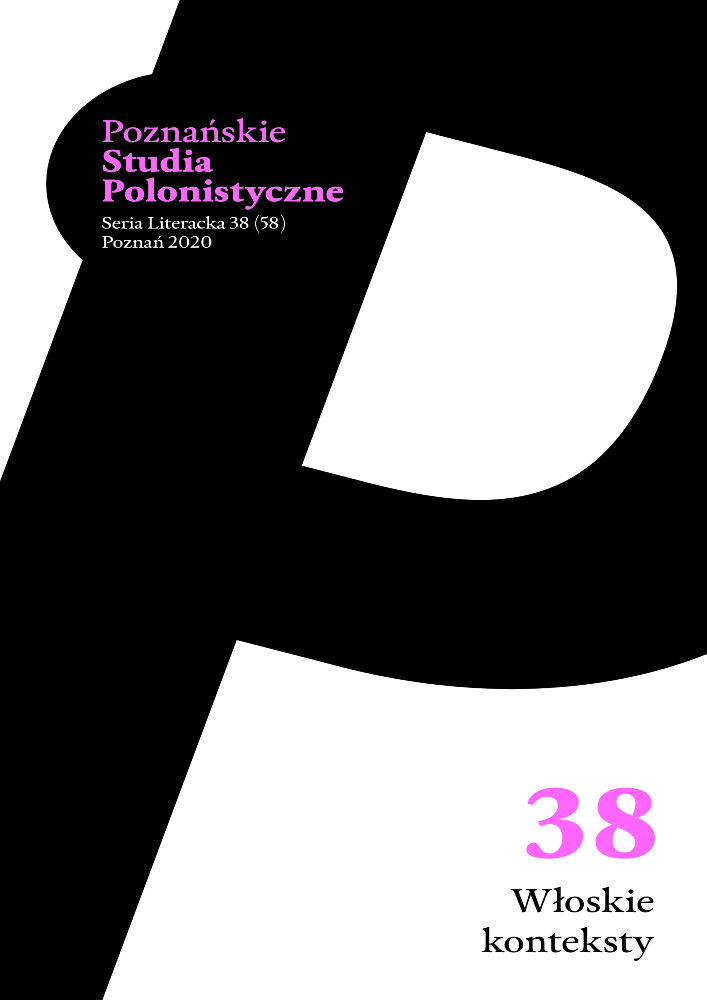Abstract
An expression used in the title of my paper refers to several places in contemporary and ancient Italy: the Gulf of Naples, the shores of Lampedusa and Sicily, and the mouth of the Tiber River. These places form the background of the tragedy of African and Middle East refugees shown in poems by Tomasz Różycki: Lawinia (Lavinia) from the collection Litery (Letter by Letter, 2016) and Strefa komfortu (Comfort Zone) from the newest poetry book Kapitan X (Captain X, 2020). My detailed analysis of the two texts is an attempt to describe their formal and semantic complexity, especially their unique tone that mixes sharp irony with tender compassion.
References
Auerbach Erich (2004), Blizna Odyseusza, w: tegoż, Mimesis. Rzeczywistość przedstawiona w literaturze Zachodu, przeł. i przedmową opatrzył Zbigniew Żabicki, przedmowa do drugiego wydania Michał Paweł Markowski, Prószyński i S-ka, Warszawa, s. 29-48.
Barthes Roland (2012), Efekt rzeczywistości, przeł. Michał Paweł Markowski, „Teksty Drugie”, nr 4, s. 119-126.
Curtius Ernst Robert (2009), Literatura europejska i łacińskie średniowiecze, przeł. i oprac. Andrzej Borowski, Universitas, Kraków.
Czabanowska-Wróbel Anna (2019), Ekonomia „Liter”, w: Obroty liter. Szkice o twórczości Tomasza Różyckiego, red. Magdalena Rabizo-Birek, Anna Czabanowska-Wróbel, Universitas, Kraków, s. 311-332.
Genette Gérard (2014), Palimpsesty. Literatura drugiego stopnia, przeł. Tomasz Stróżyński i Aleksander Milecki, słowo/obraz terytoria, Gdańsk.
Gumbrecht Hans Urlich (2016), Jak podchodzić do „poezji jako rodzaju uwagi”?, przeł. Joanna Krajewska, „Forum Poetyki”, nr 3 (zima), s. 42-53.
Kubiak Zygmunt (1998), „Eneida”, łódeczka na morzu, w: Wergiliusz [właśc. Publiusz Wergiliusz Maro], Eneida, przeł. i oprac. Zygmunt Kubiak, Świat Książki, Warszawa, s. 7-41.
Lampedusa Giuseppe Tomasi di (2005), Syrena, przeł. Michał Bristiger, Jadwiga Dąbrowska, „Zeszyty Literackie”, nr 3/91, s. 5-24.
Różycki Tomasz (2013), Tomi. Notatki z miejsca postoju, Fundacja Zeszytów Literackich, Warszawa.
Różycki Tomasz (2016), Litery, a5, Kraków.
Różycki Tomasz (2020), Kapitan X, a5, Kraków.
Runia Eelco (2010), Obecność, przeł. Elżbieta Wilczyńska, w: Teoria wiedzy o przeszłości na tle współczesnej humanistyki, red. Ewa Domańska, Wydawnictwo Poznańskie, Poznań, s. 75-123.
Stanisz Marek (2019), Ciemne metafory Różyckiego, w: Obroty liter. Szkice o twórczości Tomasza Różyckiego, red. Magdalena Rabizo-Birek, Anna Czabanowska-Wróbel, Universitas, Kraków, s. 143-159.
Wergiliusz [właśc. Publiusz Wergiliusz Maro] (1998), Eneida, przeł. i oprac. Zygmunt Kubiak, Świat Książki, Warszawa.
License
Authors
Authors of texts accepted for publication in „Poznańskie Studia Polonistyczne. Seria Literacka” are required to complete, sign and return to the editor's office the Agreement for granting a royalty-free license to works with a commitment to grant a CC sub-license.
Under the agreement, the authors of texts published in „Poznańskie Studia Polonistyczne. Seria Literacka” grant the Adam Mickiewicz University in Poznań a non-exclusive, royalty-free license and authorize the use of Attribution-NoDerivatives 4.0 International (CC BY-ND 4.0)Creative Commons sub-license.
The authors retain the right to continue the free disposal of the work.
Users
Interested Internet users are entitled to use works published in „Poznańskie Studia Polonistyczne. Seria Literacka” since 2016, for non-commercial purposes only, under the following conditions:
- attribution - obligation to provide, together with the distributed work, information about the authorship, title, source (link to the original work, DOI) and the license itself.
- no derivatives - the work must be preserved in its original form, without the author's consent it is not possible to distribute the modified work, such as translations, publications, etc.
Copyrights are reserved for all texts published before 2016.
Miscellaneous
Adam Mickiewicz University in Poznań retains the right to magazines as a whole (layout, graphic form, title, cover design, logo etc.).
